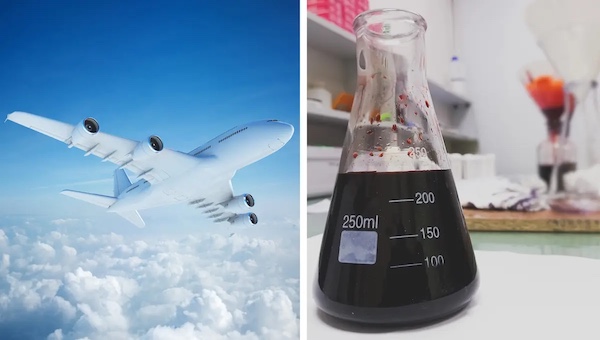
BIOFUEL IS IN DEMAND TO DECARBONIZE HARD-TO-ELECTRIFY SECTORS LIKE AVIATION. (REPRESENTATIONAL IMAGE)
US SCIENTISTS TURN WASTE STREAMS INTO JET FUEL THAT REDUCES CARBON EMISSIONS BY UP TO 70%
BY: PRABHAT RANJAN MISHRAORIGINAL SITE: INTERESTING ENGINEERING
Volatile fatty acids can play a critical role in decarbonizing the aviation industry.
Scientists in the United States have developed a new method that uses methane arrested anerobic digestion (MAAD) technology to convert high-strength organic wastewater into volatile fatty acids, which can be upgraded to sustainable aviation fuel (SAF).
Scientists at the U.S. Department of Energy’s (DOE) Argonne National Laboratory claimed that the cost-competitive SAF could reduce greenhouse gas emissions (GHG) in the aviation industry by up to 70%.
Argonne laboratory’s life cycle and techno-economic models were used to analyze environmental impacts and economic viability of the SAF, according to researchers.
Volatile fatty acids can play critical role in decarbonizing aviation industry
Haoran Wu, an Argonne postdoctoral researcher, claimed that as key precursors for SAF
production
, volatile fatty acids can play a critical role in decarbonizing the aviation industry.
“Volatile fatty acids from waste streams can make biofuel production more cost-effective and sustainable. Argonne’s novel technology uses a membrane-assisted
bioreactor
to enhance the production of volatile fatty acids,”
said
Haoran.
It’s claimed that the research advances goals outlined in the DOE’s Sustainable Aviation Fuel Grand Challenge which aims to
increase
the production of SAF to three billion gallons by 2030. The goal is to produce enough fuel to meet 100% of commercial jet fuel demand by 2050.
Carbon-rich wastewater from breweries used
Researchers used carbon-rich wastewater from breweries and dairy farms as a feedstock for their innovative technology instead of relying on more conventional resources like fat, oil and grease.
Taemin Kim, an Argonne energy systems analyst, stated that both wastewater streams are rich in organics, and it is carbon-intensive to treat them using traditional wastewater treatment methods.
“By using our technology, we are not only treating these waste streams but making low-carbon sustainable fuel for the aviation industry,” said Kim.
Lactic acids limit production of SAF
Lactic acids limit the production of SAF from volatile fatty acids. The Argonne MAAD technology overcomes that limitation to increase volatile fatty acid yield, according to a press release .
“Lactic acid lowers the carbon efficiency when converting volatile fatty acids to SAF. Therefore, shifting conversion away from lactic acid toward volatile fatty acid production is key,” said Wu.
In another novel innovation, scientists developed an electrochemical separation method to enhance the membrane-assisted MAAD technology.
Urgun Demirtas, a principal investigator on the research, stated that researchers developed an in-situ product recovery process to increase retention time in the membrane-assisted digesters, which allowed resilient microbial communities with abundant butyric acid producers and increasing acid productivity and concentration, hence decreasing acid production cost and acid toxicity.
Waste-to-aviation fuel pathway significantly cut carbon emissions
Researchers have maintained that the waste-to-aviation fuel pathway significantly cut carbon emissions compared to conventional jet fuel. The study also expands the use of lesser-used waste materials at a time when demand for typical bio-feedstock for SAF results in a shortage, according to the press release .
While research will continue, ultimately, scientists hope to commercialize the patent-pending process and scale the technology for widespread use.
“Designing a membrane-assisted technology that achieves a 70% reduction in greenhouse gases at a cost comparable with conventional jet fuel is a significant advancement,” Wu said.
Author: Prabhat Ranjan Mishra - Prabhat, an alumnus of the Indian Institute of Mass Communication, is a tech and defense journalist. While he enjoys writing on modern weapons and emerging tech, he has also reported on global politics and business. He has been previously associated with well-known media houses, including the International Business Times (Singapore Edition) and ANI.
AWFSM CATEGORIES
Activism | AI | Belief | Big Pharma | Conspiracy | Cult | Culture | Deep State | Economy | Education | Entertainment | Environment | Faith | Global | Government | Health | Hi Tech | Leadership | Politics | Prophecy | Science | Security | Social Climate | Universe | War
